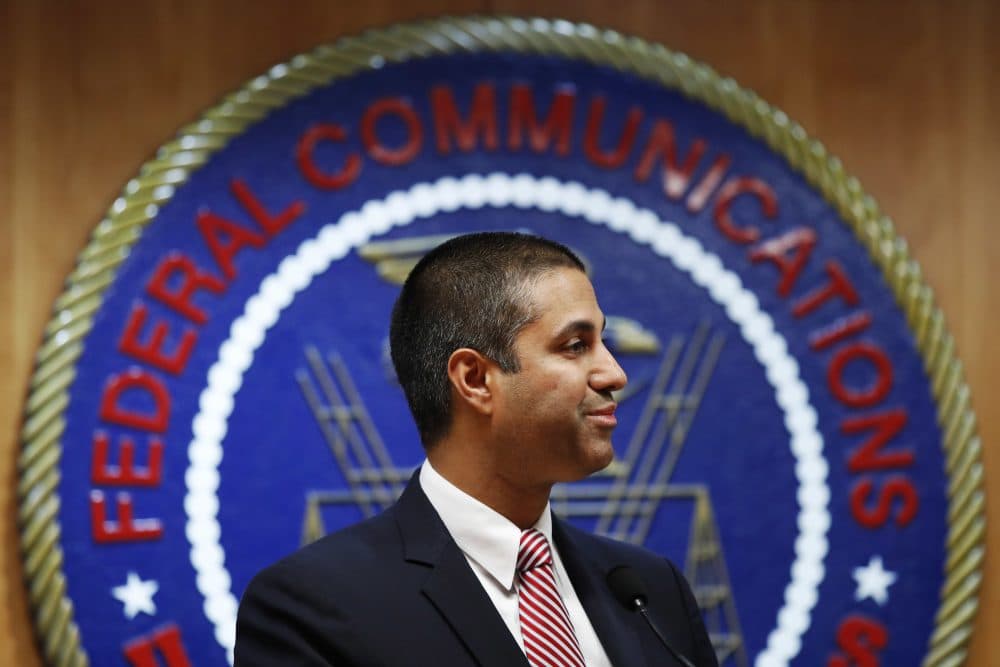Advertisement
Commentary
Remember The Man Who Killed The Internet

Ajit Pai is an outlier.
Most of us hack our way through life wondering if our labors and sacrifices will amount to something that we can stand back and remark upon one day — before we croak. In this respect, Ajit Pai is uncommonly fortunate. The FCC chairman and former Verizon lawyer just pulled off his own plan to destroy the net neutrality principle that ensures an open Internet for all. This will allow Internet service providers to charge consumers higher premiums for access to certain kinds of online content, but that’s not what we need to discuss right now.
What we need to absorb and respect is the incredible reality that Ajit Pai — a single man — is largely responsible for crippling the Internet as we know it. Yes, he was appointed to chairman by Donald Trump. Sure, he was joined in voting to kill net neutrality by fellow FCC commissioners Michael O’Rielly and Brendan Carr. But as top banana at the FCC, Pai spent the past several months publicly leading the charge against net neutrality. And when we look back at the aggressive, condescending, undemocratic, and potentially fraudulent manner in which this charge was carried out, the audacity of Ajit Pai defies both convention and ethics.
Let’s start by considering how Pai unveiled the FCC’s plan to vote on net neutrality repeal. The announcement dropped just before Thanksgiving, at a time when most people were busy basting turkeys and picking up relatives at the airport. Those who did hear the news freaked out, and with good reason. With a majority Republican FCC commission, the prognosis for net neutrality — a government-enforced regulation — was terminal. The commission would almost certainly strike down the principle, and yet, for such a quick and singular act, the consequences felt by consumers could be tremendous.
Giving companies like Comcast and Verizon the power to manipulate content loading speeds and to create pay-to-play “fast lanes” for certain types of content would reshape the Internet as we know it. Small businesses would be in grave danger of losing visibility and commerce. Billions of people could find themselves deprived of the information they needed to make sound decisions in daily life. (Or in the voting booth!) There would be no way to hold ISPs accountable for engaging in content prejudice and censorship. Altogether, these “features” of net neutrality repeal comprised a poison pill strong enough to inspire scores of Americans to submit public comments to the FCC — comments that the FCC is required to solicit before doing anything big.
But Pai was ready for this.
Not long after Pai was appointed to chairman, the comments from net neutrality advocates began pouring in. (Thank John Oliver, who zeroed in on Pai’s deregulation crusade long before November.) In theory, the FCC is supposed to take public comments like these into account in the weeks or months before a major vote. That didn’t happen this time. Why? Because according to an FCC spokesman, the commission largely ignored comments that didn’t contain vernacular-rich legal arguments. This essentially muzzled anyone without a law degree. Ajit Pai—the FCC chairman himself—has refused to put forth a rationale for this outrageous and exclusive public comment modification. (Or for stonewalling the New York Attorney General’s investigation of stolen identities being used to submit fake comments to the FCC.) And that’s the big problem here. Pai doesn’t have to explain himself. Not then, and not even now, as net neutrality withers.
As an institution, the FCC was clearly not prepared for tempering the machinations of an ideologue as pious and shameless as Ajit Pai — a man who abused his power to sever ties between the FCC and the people whom it’s supposed to serve. From the moment when Pai announced the imminent net neutrality repeal vote, the contract that exists between the FCC and the public was grotesquely violated, our opinions were ignored, our concerns were mocked in one of the most insulting ways imaginable, and as of today, an essential utility that U.S. tax dollars paid for has now been gifted to telecoms corporations. This is a brokerage of power that will have immediate and potentially devastating consequences in our daily lives. And we weren’t even given a fair chance to register dissent.
This historic act of grift and treachery needs to be placed exactly where it belongs. At the feet of Ajit Pai: the man tasked with ensuring that the FCC operates as intended. His name should be the first thing that pops into your head when your telecoms provider tries to charge you more for streaming videos or reading the local news.
Once that happens, Pai’s permanent expulsion from public office should be one of your most governing electoral goals. We can’t vote him out directly, but we can push our state attorney generals and our current lawmakers to fight back against the terrible decision that the FCC made today. Next November, we can support Congressional candidates who will fight tirelessly to reverse this outrageous subversion of democracy. And in 2020, we can elect a president who will replace Pai with a true public servant who will not only run the FCC but ensure that something like this never happens again.
It will take time. But with a broken Internet, we’ll have plenty of that on our hands soon enough.
